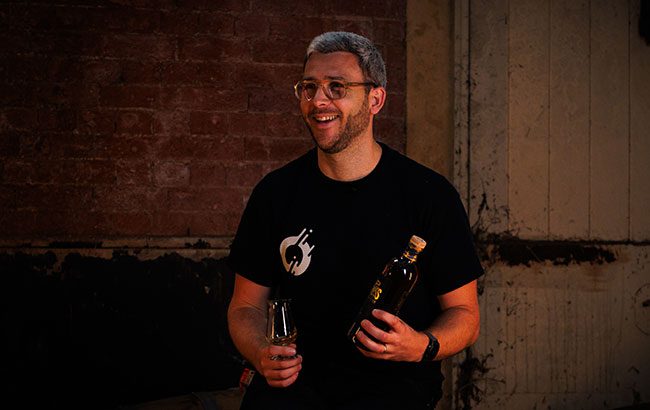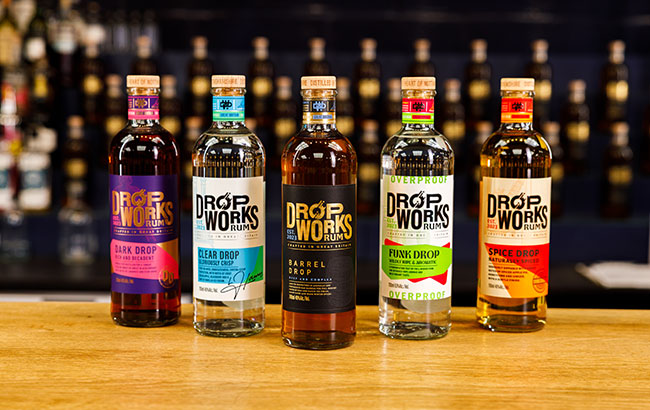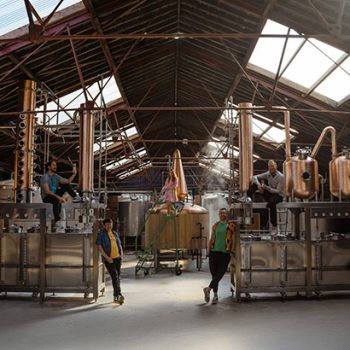DropWorks discusses need for quality and accessible rum
By Melita KielyDropWorks Distillery is doubling down on its commitment to create top-quality rums at accessible price points, for both consumers and the trade. Founder and master distiller Lewis Hayes explains why.

“What we’re trying to do is make rum that is high quality and make it accessible, rather than making accessible rum and trying to pretend it’s quality,” emphasises Hayes during a tour of the DropWorks Distillery in Nottinghamshire, UK. “It means we have to have a lower price point than we should. It means we’ve got to have flavour profiles that will appeal to a broad selection of people.”
It’s far from an easy task, as Hayes explains. It would be far simpler to create a ‘core’ DropWorks style. However, this wouldn’t satisfy his goal to show the breadth of flavours and styles rum can offer. The distillery’s five-strong range of British rums currently comprises Clear Drop, Spice Drop (thought to be the first spiced rum made without any added spices), Dark Drop, Funk Drop and Barrel Drop.
The range was curated to inspire bartenders to have fun with rum and to shake up consumer preconceptions about what rum can be. But, importantly, it is also about accurately acknowledging the category’s history.
“We’re asking bartenders to rethink what they know rum is,” Hayes says. “The history of rum is often reduced to pirates and palm trees; there’s a history to be told by people far more eloquent than me, who are more knowledgeable than me, and who can really communicate authentically about the islands where rum is made. The history of rum is dark, so this idea of a ‘tropical escapism holiday’ doesn’t sit easily with me, and neither do pirates or sea monsters. It’s disingenuous. It’s a Disney version of reality, and we need to own that better as an industry.
“It’s not my story to tell, but I want it told, and I want to help people tell that story. So it’s why we don’t focus on the history, and why we are focusing on production and moving the category forward.”
DropWorks is set in a unique location in the UK, located on the Welbeck Estate. Welbeck is a historic country estate, nestled within 15,000 acres of forest and hills in Nottinghamshire. Its history is fascinating – and its setup today means visitors can not only book a tour with DropWorks, but make a full day out of the visit, spending time at numerous galleries on site, perusing the farmer’s shop, dining at the local café, and more.
The grounds were once home to Welbeck Abbey, which was established as a monastery in 1153. After the Dissolution, the Bess of Hardwick’s youngest son, Sir Charles Cavendish, acquired the abbey. It has passed down through generations and became the country seat to a succession of Dukes of Portland.
Today, the estate boasts a mix of residential and commercial properties. DropWorks Distillery is one of those commercial projects. While the distillery’s production is fully up and running, and its on-site warehouse is filling up, Hayes and his team have much more planned.
Eventually, the distillery will have a refurbished entrance to welcome guests. The boiler and chiller will be moved and strategically hidden from view to allow better access. The nearby brewery will then be more reachable, while another café will open adjacent to the building – which will hopefully entice guests to stay longer.

Why is this important? For one thing, it will give Hayes and the DropWorks team more time to communicate their messaging about rum, and to educate guests further about the category.
“Rum has so much more to offer,” Hayes says. “The category has so often been defined by mass-produced rums that focus too much on artificial flavours, rather than highlighting the spirit itself. At DropWorks, we want to change that.
“Rum is at a pivotal moment in its evolution, where, unlike more mature premium spirits such as whisky or Tequila, rum remains underdeveloped in consumer perception and also the regulation that surrounds the category – or lack of it, in fact.
“This presents a unique window for DropWorks to shape the future of the category, by setting new standards in quality, transparency and production integrity, while making it our mission to show what it can truly be: a premium, naturally full-flavoured spirit, crafted with integrity and a focus on quality from start to finish.”
Sustainability and a first for yeast
Building the distillery sustainably has been imperative, and the estate is also applying for B Corp certification. DropWorks’ dunder – the liquid left behind after distillation – goes into an anaerobic bio-digester, which creates electricity to power local buses, among other things.
Due to the remote location of the distillery – “we’re off grid”, notes Hayes – the distillery uses LPG gas to fuel the boiler, which, he hopes, will eventually be supplemented with photovoltaics (essentially, the conversion of light into electricity using semiconducting materials).
“Water is sitting in an ancient aquifer underneath us,” Hayes continues. “So, we’ve got our own water resource. [The estate] has billions of tonnes of oak for us to start creating English oak casks sustainably; we’ve got plenty of space. We’ve got underground tunnels [a historic part of the estate], and the cow shed [now DropWorks’ warehouse] is an amazing building. We’ve got plenty of space for expanding; that’s why we chose this site. It just so happens that they also have a passion for hospitality, food and drink.”
DropWorks distils its rums on site, which are made from molasses. The distillery brings in tankers filled with 45,000 litres of molasses at a time, which is enough to create approximately 90,000 bottles of rum.
DropWorks has another unique aspect to its rum-making approach, which is the use of a three-strain yeast variety – “which has been recorded as a world first”, highlights distiller Shaun Smith. But this is about more than just being the first to use this strain, he notes.
“This is interesting because it is a world first, and because it produces a unique flavour profile,” Smith explains. “It’s technically three different yeast strains living symbiotically together, so we’re calling it our wild Trinity Yeast.”
Hayes adds: “Although we talk about the organoleptic qualities of the cane, the flavour profile is all about the yeast strain, much more so than the flavour of the raw material.”
Affordable pricing is critical
The distillery boasts a trio of stills: a pot still, a double retort and a hybrid still. “This is England’s first double retort, which is synonymous with rum,” says Hayes. “We haven’t created this process or the shapes of the stills to make aromatic rum. A lot of what we are doing is using tried-and-tested techniques that have been tested for generations. But the big guys don’t do it. They don’t need to spend a month doing what we do.

“It means that even through a single run – it’s taking us a month to ferment– what comes off [the still] will be about 150 to 180 litres. That was a month well spent. We then get 150 to 180 litres of really aromatic, really soft alcohol.
“That’s what we’re trying to show bars. Not only are we able to do that, but we’re able to price it in a way that means they can afford to use it. It’s not just something we charge a fortune for that then sits on the back bar. No, this is speed-rail stuff. We’ll have the conversations internally about margins and profits, but we’ve got to provide people with quality liquid at a price they can afford.” Funk Drop, for example, the distillery’s overproof rum that clocks in at 63% ABV, is available to the on-trade for “about £20”, Hayes says.
“They go: ‘Why is it so cheap?’ Because if it’s not cheap, you guys can’t use it. This is why we’re working with top-quality bars and restaurants right now, because if we put this out to everybody, they’ll go: ‘Well, it’s just a cheap product’. The motivation here is to make it accessible for bars and restaurants because if they can use it, more people will be able to see it, taste it, experience it and understand that it is quality. Whereas if we just put it out there to the public and they see a cheap product, they’ll immediately assume poor quality,” he adds.
Crowdfunding and growth plans
DropWorks Distillery will be crowdfunding for its next phase of development later this year, as it pursues its ambition to grow threefold in 2025 and cement itself as the “rum of choice” in the UK.
“We’ve got great distribution now across the whole of the UK,” Hayes notes. “We’re in so many different wholesalers now as well. We can now start to transition through the gears.” With various cask types maturing patiently in the warehouse, including Bordeaux red wine casks, ex-Bourbon, chestnut, and even an ex-Port Ellen barrel, there’s much still to come from DropWorks.
Education and smarter, more collaborative ways of working within the industry, Hayes hopes, will be important actions for growth: “By talking to consumers about how rum is made and the diverse ways it can be enjoyed, we’re helping to build a deeper understanding of the category while leading a new wave of modern, genuinely British-made rum.”
Related news
Kōloa Rum loses lawsuit over 'discriminatory' shipping law
